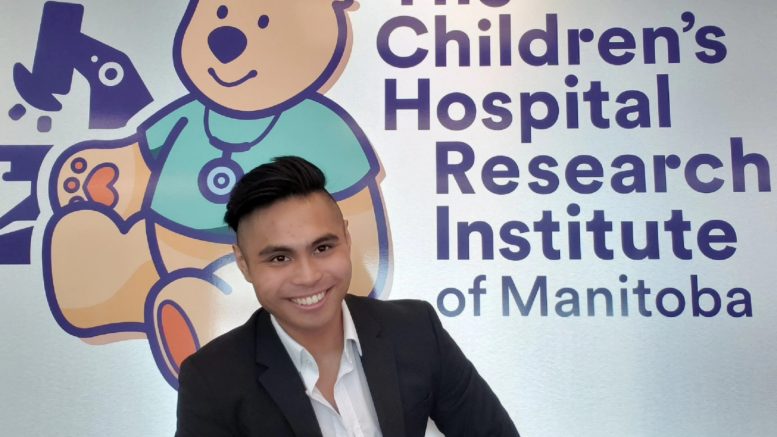On April 7, 12 finalists in the Three Minute Thesis (3MT) competition will face off to determine the who will advance to the first in-person western regional competition since 2019. For graduate students in a thesis-based program, the 3MT competition may be an opportunity to showcase original research for the first time and help students gain confidence as researchers.
For Nolan De Leon, winner of the 2021 Dr. Archie McNicol Prize first-place at the University of Manitoba’s 3MT competition, taking part in the competition was an important first step toward pursuing both a doctoral degree and a medical degree concurrently. After De Leon’s success at the 3MT competition, he decided to transfer his credits and transition into a PhD program, continuing the same winning research project he presented in 2021.
De Leon’s thesis project aims at early detection of prenatal abnormalities by examining the genetic makeup of the fetus. Specifically, De Leon wants to develop a reliable detection strategy for congenital diaphragmatic hernia (CDH), a condition where the fetus’ abdominal organs herniate through a small hole in their diaphragm and push up against their lungs.
In De Leon’s 3MT presentation, he tells the story of an expecting family that only finds out their child has CDH after an ultrasound reveals the condition is too far gone for effective treatment.
“I am going to change that,” De Leon said.
“What if your doctor could put your worries at ease or prepare you for the worst with a more accurate test? The answer is in circular RNAs.”
An abundance or deficiency of circular ribonucleic acid is an indicator of CDH long before birth. By extracting amniotic fluid, amplifying and detecting levels of circular RNA, doctors may be able to diagnose and determine proper treatment for CDH more reliably. Moreover, it would prevent weeks of waiting for specialist diagnosis from an ultrasound, which can be painful for families to endure and cost precious time, preventing early treatment.
“My goal is to confirm the differences in circular RNA levels between the amniotic fluid of healthy babies and CDH babies with our new liquid biopsy,” De Leon said.
The 3MT competition proved De Leon could be a successful science communicator, which will serve him well as a researcher trying to communicate complex ideas to the public and as a future physician.
“If you can understand science, but you can’t speak it to your patients, they’re going to leave the clinic stressed because they have no idea what you just told them,” De Leon said.
De Leon encourages graduate students to take the leap into the 3MT competition despite any anxieties about presenting. He suggested winning the competition should not be the ultimate goal — rather, students should practice their communication skills. These skills can pay dividends in applying for scholarships or writing papers for publication.
“If you’re thinking about doing it, just do it,” De Leon said.
“Take a step. I think, even in research, it’s all about taking a risk […] You can’t play it safe all the time to be comfortable.”
De Leon pushes himself out of his comfort zone in his extracurricular activities as well. In October 2021, De Leon lifted nearly 5,900 kilograms in one hour through Turkish get-ups, breaking the Guinness world record. He took on the challenge in a campaign to raise money for the Mood Disorders Association of Manitoba. In total, his campaign raised over $3,000 for mental health.
De Leon knows firsthand the stressors facing the 3MT finalists and graduate students more generally. He wanted to add his support to all students doing great research.
“I want to say to all the 3MT competitors, your research is amazing — you guys are amazing and everything that you’re doing has the potential to bring a positive change in the world,” De Leon said.
“So, even though everything has been doom and gloom for the past two years, there are good people, there are good things happening and we’re needing to remember that.”



